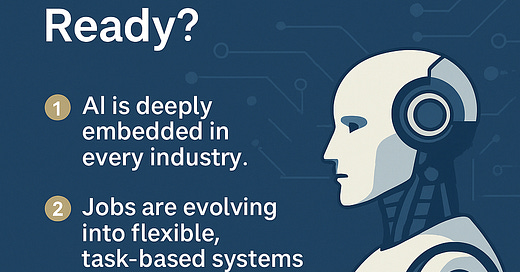Catching Up with the Future: What the AI Workforce Means for the Caribbean
By Julian Rogers | Caribbean Bridges
The future of work isn’t arriving, it’s already here. As the World Economic Forum (WEF) revealed in its latest insights from China, the global labour market is undergoing seismic shifts. For us in the Caribbean, this is both a warning and an invitation: catch up now or risk being left behind.
Three Trends Redefining Global Work
1. The AI Workforce Is Real and Expanding
AI is no longer an experimental tool; it’s embedded in HR, legal services, design, customer service, and project management. Generative AI systems are not replacing humans outright but are transforming how tasks are completed. WEF estimates that 44% of workers’ core skills will be disrupted in the next five years.
2. From Jobs to Tasks
Work is being unbundled into discrete, automatable tasks. Job roles are giving way to task-based, skills-first thinking. This evolution requires agility and the ability to work across domains, not just within a narrow job title.
3. Soft Skills Are the New Hard Currency
Resilience, creativity, empathy, and leadership are now among the most valued attributes in the workforce. These "human" skills will be crucial in distinguishing us from machines and ensuring we can manage, rather than be managed by technology.
Implications for the Caribbean
1. Immediate AI-Literacy Is Non-Negotiable
We must embed AI literacy into national education systems, training programmes, and public-sector transformation plans. We need to normalise tools like ChatGPT and AI design software in classrooms, not just boardrooms.
2. Reinvent Work in Key Sectors
Tourism, healthcare, education, and public service are ready for transformation. Virtual assistants, digital learning platforms, AI-powered diagnostics aren’t luxuries; they are essentials if we are to stay globally competitive.
3. Embrace the Gig and Remote Economy
We must invest in digital infrastructure, upskill gig workers, and build platforms that allow our freelancers to compete globally. Remote work shouldn’t just be hosted in the Caribbean; it should be powered by Caribbean expertise.
4. Teach Soft Skills Strategically
Our natural creativity and interpersonal strength must now be systematically nurtured. These are not afterthoughts but pillars of our future resilience.
Regional Call to Action
Establish National AI Strategies: Clear targets for education, business, and government adaptation.
Reform Accreditation Systems: Introduce micro-credentials for data, coding, AI tools, and digital design.
Scale TVET and Community Colleges: With practical courses in prompt engineering, AI ethics, and remote collaboration tools.
Create a Regional Foresight Hub, either under CARICOM or UWI, to monitor and localise global trends.
We still have a window to catch up—but only if we treat the future as if it were the present.
Let me have your thoughts: julian@caribbeanbridges.com





The robots are not coming; they are already here. AI literacy of a country's citizens needs to be a priority. AI already has an IQ of 150; Einstein's IQ was 160. It is expected that the next AI IQ jump will be to 1500. AI literacy alone is not enough. Human Intelligence (soft skills) and Spiritual Intelligence (virtues, ethics) need to be included in the curriculum. Without them, we will realize the worst of dystopia that Geoffrey Hinton (the Godfather of AI) and Mo Gawdat are warning us about.